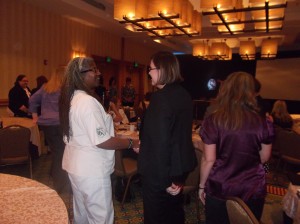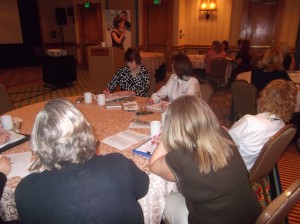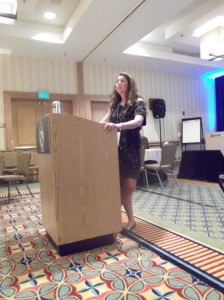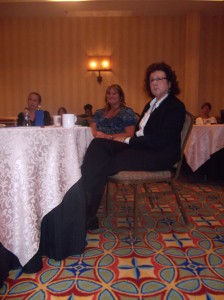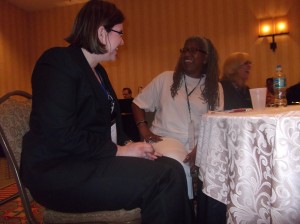Report from the 3rd Annual APCO Women’s Conference
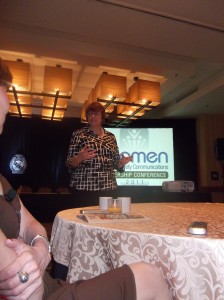
APCO Past President Chris Fischer, one of only three women who have served full terms in APCO's leadership, introduced keynote speaker Vicki Hitzges.
Fact: Currently, no women serve on the APCO International Executive Committee, and only three women in APCO’s history have served full terms. Designed to empower, connect and cultivate leaders, the Women in Public Safety Communications Leadership Conference was held in Orlando, April 13-14. In his statement kicking off the conference, APCO First Vice President Gregg Riddle made it clear to attendees that women are integral to this industry, saying, “Think about stepping up at the chapter level and ultimately at the association level because we certainly need your perspectives and your service.”
Communication, personal success, people skills, technology, management issues, career development and work-life balance were topics addressed through sharing experiences during the two-day event. Speakers and attendees were not afraid to tell their stories and make it personal in order to serve as support and resources for each other. These experiences had touches of humor, shared frustrations and possible solutions for attendees to take with them.
APCO Past President Chris Fischer, who facilitated the conference, said, “We all have pretty full lives. So not only am I a mom and a grandma and a comm center director, but I’m serving on the Board at the same time. And so balancing all of those issues and remaining relatively sane was my goal. … This is about bringing people together and bringing important women together.”
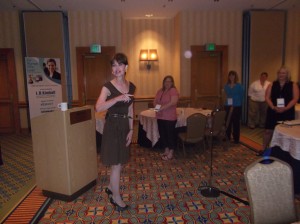
Vicki Hitzges brought incredible energy to the conference, engaging the audience and making them laugh and relate through out her opening session.
Reaching Out
“Why do people get jobs, keep jobs and move ahead in a job? After five years and a million dollars, [a Carnegie study] determined that 85% of what makes people success had nothing to do with their ability. It had to do with your ability to implement, persuade and get along with people,” said Vicki Hitzges, a former corporate publicist and television news anchor turned international corporate speaker.
In an electrifying and dynamic opening session, Hitzges engaged the audience in a discussion about people skills, advising attendees on how to successfully cultivate themselves to communicate, make connections, motivate people and ultimately advance their careers. She engaged the audience through humor and activities — activities people jumped up to participate in and enhanced their personal understanding about how they listen and communicate.
The main principle: “People reach out to people who reach out.” And it includes attitude.
“If you smile at someone do they smile back? When you’re kind to someone, are they kind back?” she asked. “No, not always. People can be stinkers. … But don’t do it for what you’ll get, do it for what you will become, and what you will become is joyful. Who couldn’t use a bucket full of joy right now?”
Hitzges gave six tips for implementing this principle and a positive attitude based on her experiences working for one of “the most insecure, witchy women I have ever been around” and for a supervisor who was the exact opposite — someone she would “do anything for” regardless of how hard the staff was worked and how long the hours were. All because that supervisor cared.
1) Eye contact: “Greet people, don’t just meet people,” said Hitzges. The first way to accomplish this is through eye contact.
“It’s life skill 101,” she said. “If you know someone who can’t do that, you can actually look at someone right at the bridge of their nose and not at their eyes, and they can’t tell the difference. It’s a wussy way out, but it works.”
2) Light up: “You’ll never be anything successful unless you can look people right in the eyes and then smile,” said Hitzges. “Light up. Don’t be all doom and gloom. Smile at your people.”
3) Have a firm hand shake.
4) Listen: “Everybody thinks they are a good listener, just like everybody thinks they are a good driver,” she said.
She encouraged attendees to really pay attention to what people are saying, ask questions, empathize and use body language to show your engagement. Tip: Lean in to listen to someone and make sure your arms are not crossed.
5) Encourage people: “A psychologist once told me something obvious: We cannot affirm ourselves; we need each other,” she said. “You need 10 ‘atta-girls’ or ‘atta-boys’ for every ‘you jerk.’”
It’s important for people to be acknowledged for the work they do and to learn how to give and receive a compliment. Compliment specific observable behavior. “If your complements are genuine, not flattery, people will take that in like a flower in the new day sun,” she said.
When receiving a compliment, don’t play compliment tennis or fake humility. Just say thank you.
6) Look for the good in people: “It’s so easy to see the bad in people and the bad in ourselves, it’s like we’re hardwired for it,” said Hitzges. “We are all so painfully aware of our inadequacies. Look at the good you’ve got. The world is just full of bad stuff, but it’s also full of good stuff. ”
Beyond a Mentor
Although initially intending to provide primarily important information professionals should know about the federal government, FCC Public Safety & Homeland Security Bureau Deputy Commissioner Jennifer Manner addressed factors that were important to her career and to the careers of others.
Everyone knows what a mentor is and does, but Manner stressed the importance of having and being a sponsor — someone who takes the next step and advocates for you. Former FCC Commissioner Kathleen Q. Abernathy filled this role in Manner’s life.
“[Abernathy] is my sponsor,” said Manner. “She has always been there to talk to me, she has also been there to advocate for me. That’s something I would urge and have had throughout my career that is critical. Sponsors are harder [to find] and are something you have to cultivate. … Someone would have to choose you too.”
Manner encouraged attendees to stay informed of what the FCC and other relevant federal organizations are doing that affect public safety communications. She urged attendees to at minimum sign up for the FCC daily, which provides updates on all of the Commissions Notices for Proposed Rulemaking on Next Generation 9-1-1, broadband and emergency alerting, and other activities.
“I think it’s really good for people to get involved in national issues, so that public safety can be heard,” she said. She advised attendees to call the Commission with their concerns and reach out to the Congressional 9-1-1 Caucus. She also stressed the importance of joining associations like APCO.
“Participate in your trade association,” Manner said. “Get involved, certainly join. One of the things I’ve done the best in my career was to join associations and take leadership roles. … There’s ways to do things that are less time consuming that get you visibly and increase your credibility. … I think I’ve had the ability to move around because I’ve kept all my contacts. Women tend to have very narrow relations; they pick a few people and have very close relationships. Men tend to have wide nets. If that’s not a natural inclination for you, a good thing to do is join these organizations because it forces you to. I’m never affair to say hello to anyone. Even if they first step in going to a meeting and bring your business cards. You never know where that relationship is going to lead.”
Be Empowered
Roxanne Brown, a former dispatcher, long-time APCO member and current consultant for LR Kimball, posed a pivotal question to the attendees: “If not you, who will lead?”
“I didn’t [choose to become a leader],” she said. “Some people do. I was just having fun doing the things I like to do and seeing if I can fix some things.”
Brown, who recognizes the importance of her mentor at the Stockton (Calif.) Police Department, emphasized the importance of stepping outside your comfort zone or box. She said, “I had the opportunity to do unique things because I was willing to step out. … Sometimes, you work later hours, you do things off the books and you do all kinds of things to get the job done. But the opportunities are there. Sometimes it’s just because you stay too long at a meeting. [Looks at Fischer, shaking her finger.] That’s what happened with CALEA. I wouldn’t change it.”
According to Brown, it’s important for leaders to listen to their people — to the good and the bad. Just because a person has more seniority, knowledge or a high-ranking title doesn’t make them a leader. Also, “a willingness to make that decision is being a leader. Right, wrong, indifferent, make a decision,” she said.
“People say, ‘I’m just a dispatcher,’” said Brown. “You know what a dispatcher is a leader. Everything is in your hands when you take a call. You are responsible for getting things done”
Brown also pointed out that just because someone wants to be a leader doesn’t mean they have the skills and ability to lead. She stress, “I have seen people flop who want to be a leader because they don’t want to be responsible. You can delegate a lot, but you can’t delegate the ultimate responsibility.”
In summary, Brown outlined her defining characteristics of a leader. Leaders:
- Listen to their people;
- Are risk takers;
- Are willing to change — “the dirty six-letter word in dispatch,” she said;
- Are confident and self assured; and
- Have passion for the job. “Passion for a leader translates to the ability to keep working when you get the door slammed in your face,” said Brown.
Final Thoughts
According to Brown, the Women in Public Safety Communications Leadership Conference has been a valuable experience to her and her employees who have attended, providing a unique opportunity to learn and grow. This conference is an opportunity for women to connect and become resources for each other. An opportunity few of them have on a daily basis.
“It’s meant to be small; it’s not meant to be 200 people because then you’re just talking at them,” Brown said. “It’s been very successful.”
Return attendee Cindy Hartkopp, a former dispatcher and current Intrado employee said, “I saw so many wonderful and interesting people speak last year, so I told my boss to put it in the training budget for this year. It’s great to be able to network and hear the inspirational women.”
In her presentation, Loredana Elsberry Schwarts, MABC, RPL, emphasized that attendees being involved in APCO goes beyond the confines of the association. It’s an opportunity to shape the public safety communications industry and really have an impact. Be a thought leader.
“You don’t have to have the title of president or director to be a leader. You can do it at any level,” she said. “I think you ladies have taken the first step by being here.”
Plan to learn, act and connect with current and upcoming APCO International and public safety communication leaders in 2012. Save the dates for the next conference: April 18-19, 2012, at the Hyatt Regency Grand Cypress in Orlando. For more information on this year’s conference and upcoming information, visit http://wipsc-legacy.apcointl.org.
About the Author
Natasha Yetman is associate editor for APCO International’s Public Safety Communications magazine. Contact her via e-mail at yetmann@apcointl.org.

